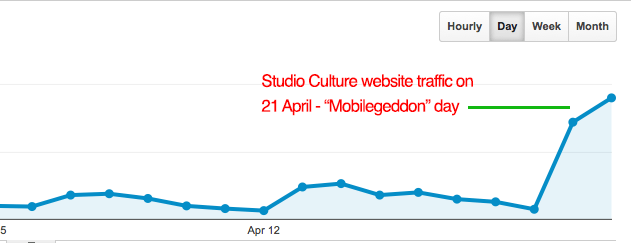
If you haven’t read about it yet, Google’s latest search engine algorithm update, dubbed by many as ‘Mobilegeddon’, is here. So what do we do about it?
What is Mobilegeddon, and how will it affect us?
Through Mobilegeddon, Google will change the way it ranks its search engine results based on how ‘mobile friendly’ those websites are.
According to a report by the ABC, more than half of Australia’s top companies may suffer from Mobilegeddon and that desktop-only websites will “plummet” in search rankings. This could be serious news for businesses that rely on their online presence for revenue.
So what does this mean, exactly? Should we run for our lives? Should we duck and cover? Should we start pointing fingers at ‘The Man’?
Well, not exactly. If you manage a website that isn’t mobile-friendly, it’s not the time to run or start pointing fingers. It’s time to roll your sleeves up and ensure that your website complies with mobile guidelines. With more and more people using mobiles as a means of search, mobile-friendly websites are now as important as ever.
Ultimately, this algorithm update is here to help the end user. So if you’re a regular Joe, then this update will be great: when you surf the web on your mobile, you’re now more likely to find websites that actually fit into your screen.
Search Engine Optimisation (SEO) and Mobilegeddon: the good news
What if you had a mobile-friendly website? We recently redesigned our own website to make it as mobile-friendly as ever – and it’s paid off. Here’s a brief graph of our website traffic after the Mobilegeddon:
Why do mobile-friendly websites matter?
About 60% of website traffic now comes from mobile. If you depend on your online presence for revenue, Google’s Mobilegeddon algorithm update is something that should be taken very seriously.
In terms of SEO, how can we prepare for Mobilegeddon?
Barry Schwartz has come up with a fantastic Mobilegeddon QnA for Search Engine Land. We’ve summarised a few questions below, but we recommend you reading the article for a more comprehensive understanding on what you can do, and what you should/shouldn’t worry about.
Q: Will it impact desktop searchers? Will my desktop rankings drop?
A: No, it will only impact mobile searchers and will have no impact on your desktop rankings.
Q: Will it impact tablet searchers?
A: No, this only impacts searches done on mobile smartphone devices, not tablets.
Q: How do I know if my site is mobile friendly?
A: There are a few ways but the only way to know if your site is already indexed by Google as mobile friendly is to see if your site has the mobile friendly label in the mobile search results. Using the mobile friendly testing tool will show if you pass the test, but Google may still need some time to update their index to pick up on the fact that your web pages are mobile friendly. You can also the mobile usability reports within Google Webmaster Tools, but those can be fairly delayed.
Q: Is the mobile friendly algorithm site-wide or on a web page by web page basis?
A: The mobile friendly algorithm is on a page by page basis. So even if only some of your web pages are not mobile friendly, some come benefit from this algorithm.
Q: Is this a real-time or delayed algorithm?
A: Unlike Panda or Penguin, the mobile friendly algorithm is run in real time. Sometimes the mobile friendly label can be delayed in showing up in the search results, but Google will pick up on those changes in real time.
Q: If I make my site mobile friendly today, how long will it take Google to pick up on those changes?
A: As we said above, the algorithm is real time. We also explained above that Google has to crawl your web pages to determine if they are mobile friendly. Early tests show that it can take anywhere from a few hours to over 72-hours if you do everything right for Google to show your web pages as mobile friendly. I would not be surprised if large sites can take up to a month to be displayed as fully mobile friendly. So make sure your most important pages are indexed as mobile friendly sooner than later.
Q: Can you be partially mobile friendly according to Google?
A: No, a web page is only mobile friendly or not mobile friendly, you cannot be more or less mobile friendly than another web page. It is a yes or no on being mobile friendly or not.
Q: Will my non mobile friendly web site drop in the rankings tomorrow, April 21st?
A: Not necessarily. Google said it can take a few weeks for the algorithm to roll out. So you might not notice the change for a few days to a few weeks.
Q: After it does roll out, how badly will my non mobile site be impacted?
A: Truth is, it is unknown right now. We were told it will be more significant than both the Panda and Penguin algorithms, which may mean that more than 11% of the search results will change from this.
Q: Will Google delist my site from search if I do not go mobile friendly?
A: Absolutely not. Although there are shady SEOs saying so.
Q: Will this impact AdWords ads?
A: No, this is only for organic listings, AdWords may have their own mobile factors but this is unrelated.
Mobilegeddon: closing thoughts?
How about you? Have you noticed any differences with your websites (in terms of traffic or rankings) after the update, or are you still yet to see more tangible results? If you’d like to have a free discussion about how we could help with your SEO or make your website mobile-friendly, don’t hesitate to contact Studio Culture.


